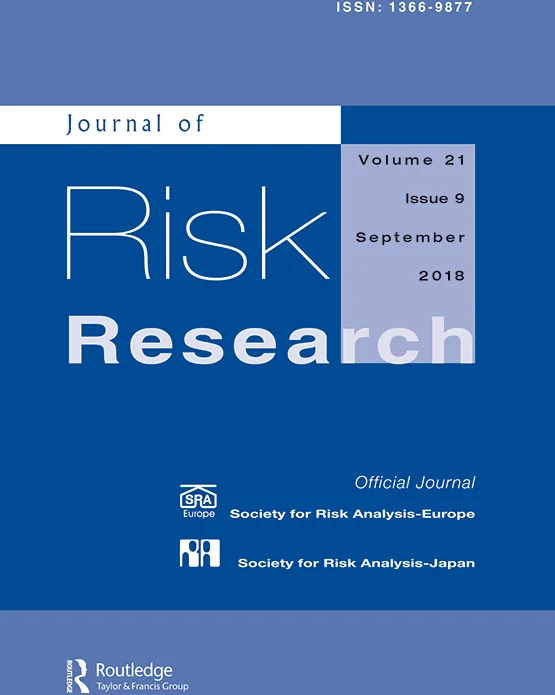风险研讨会中风险评估的有效性:计算文化的作用
IF 1.7
4区 管理学
Q1 SOCIAL SCIENCES, INTERDISCIPLINARY
引用次数: 0
摘要
摘要:本文研究了以“定量怀疑”为主导的风险研讨会中风险评估有效性的驱动因素。此外,它还将我们的发现与之前假设“量化热情”占主导地位的研究结果进行了对比。定量怀疑主义是一种计算文化,其特点是将风险评估视为支持包含难以量化信息的整体判断形成的学习工具。它与量化热情形成对比,量化热情是一种计算文化,认为风险评估完全描述了现实。先前的研究主要集中在理解在量化热情的计算文化下风险评估的有效性。为了理解是什么驱动了风险评估的正确性,以及在定量怀疑主义的计算文化下评估车间风险所需的时间,我们使用了一个基于主体的模型,该模型模拟了风险车间的风险评估,并使用约束满足网络ECHO (CSN)模拟了主体的认知过程。我们的模拟表明,与量化热情条件下的风险研讨会相比,个人和集体风险评估往往会出现长时间的停滞,并且对讨论有很强的路径依赖性。对相关参与者进行优先排序,以牺牲对低风险的正确评估为代价,提高对高风险的正确评估。尽管在不同的计算文化中,风险评估有效性的驱动因素有相似之处,但我们的结果表明,主要的计算文化在设计和实施风险研讨会时很重要,以提高其有效性。本文章由计算机程序翻译,如有差异,请以英文原文为准。
The effectiveness of risk assessments in risk workshops: the role of calculative cultures
Abstract This paper investigates drivers of the effectiveness of risk assessments in risk workshops dominated by ‘quantitative skepticism’. Moreover, it contrasts our findings with those of previous research that assumed the dominance of ‘quantitative enthusiasm’. Quantitative skepticism is a calculative culture characterized by an attitude that regards risk assessments as learning tools supporting the holistic formation of judgments incorporating difficult-to-quantify information. It contrasts with quantitative enthusiasm, which is a calculative culture that considers risk assessments as fully descriptive of reality. Prior research primarily focused on understanding the effectiveness of risk assessments under a calculative culture of quantitative enthusiasm. To understand what drives the correctness of risk assessment and the time needed to assess risks in workshops under a calculative culture of quantitative skepticism, we use an agent-based model that simulates risk assessment with risk workshops and that models agents’ cognitive processes using ECHO, a constraint satisfaction network (CSN). Our simulations show that, compared to risk workshops under conditions of quantitative enthusiasm, there are often lengthy periods of stagnation in individual and collective risk assessments and a strong path dependency on discussions. Prioritizing concerned participants improves the correct assessment of high risks at the expense of the correct assessment of low risks. Notwithstanding similarities in the drivers of the effectiveness of risk assessment across different calculative cultures, our results show that the predominant calculative culture matters when—to enhance their effectiveness—designing and implementing risk workshops.
求助全文
通过发布文献求助,成功后即可免费获取论文全文。
去求助
来源期刊

Journal of Risk Research
SOCIAL SCIENCES, INTERDISCIPLINARY-
CiteScore
12.20
自引率
5.90%
发文量
44
期刊介绍:
The Journal of Risk Research is an international journal that publishes peer-reviewed theoretical and empirical research articles within the risk field from the areas of social, physical and health sciences and engineering, as well as articles related to decision making, regulation and policy issues in all disciplines. Articles will be published in English. The main aims of the Journal of Risk Research are to stimulate intellectual debate, to promote better risk management practices and to contribute to the development of risk management methodologies. Journal of Risk Research is the official journal of the Society for Risk Analysis Europe and the Society for Risk Analysis Japan.
 求助内容:
求助内容: 应助结果提醒方式:
应助结果提醒方式:


